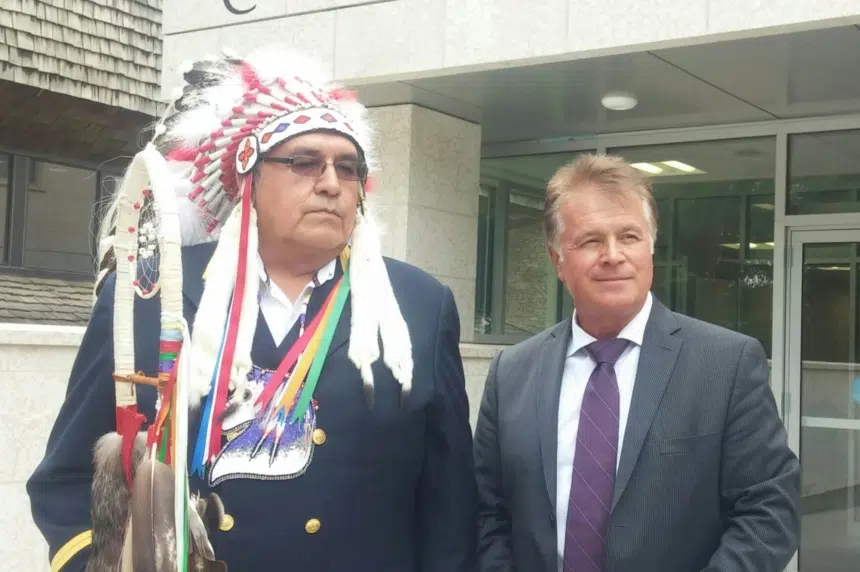Two full rows of lawyers filled the courtroom at Saskatoon Court of Queen’s Bench Wednesday to argue whether five First Nations should have to open their books to the public.
Ottawa took the First Nations to court after they refused to comply with the First Nations Financial Transparency Act (FNFTA), which requires all reserves to post audited financial statements on a public website.
Onion Lake Cree Nation Chief Wallace Fox said his First Nation is asking for a stay and the “status quo” while they challenge the validity and constitutionality of the Act itself in a separate court case.
“I am hopeful,” he said outside the court after the day’s proceedings ended. “It’s going to assist our people in terms of recognizing, in Canada and in society, that we are a sovereign nation and we never relinquished that.”
No date has been scheduled for that case since the decision in this week’s hearing will determine if it moves forward.
Last year, after the government’s November deadline had passed, it withheld “non-essential” funding from almost 50 reserves that had yet to disclose their numbers, including around $1.2 million from Onion Lake Cree Nation, according to Bob Hladun, who represents the First Nation.
“These are monies that we want because it’s monies that have been promised and there is an agreement that is in place. So we are asking those be released,” Hladun said.
“The money is to be used for programs and services, they’ve been agreed to five years ago. So the consequence is that members of Onion Lake will suffer, they will suffer harm … What they’ve done is they are going to hold the funding back, which is Indian money, which is their monies, until there is compliance with something which we say is not constitutional.”
In court there was also legal representation from Sawridge First Nation and Athabasca Chipewyan First Nation in Alberta and Thunderchild and Ochapowace First Nations in Saskatchewan. Sawridge also has a separate case going before the courts questioning the constitutionality of the FNFTA.
The arguments from Hladun said that Ottawa failed to consult with First Nations before tabling or enacting the FNFTA, that the act breaks treaty rights, and that it discriminates First Nations. Hladun also emphasized during the proceedings that Onion Lake Cree Nation had and still make their financial records accessible to their members.
“This is not a member of the band coming forward saying they don’t have access,” Hladun said during the proceedings.
Hladun added that Onion Lake Cree Nation would be open to providing their audited financial statements if they were not posted online. He said that financially the First Nation has a good record and are considered low risk.
Dene National Chief and Assembly of First Nations (AFN) regional Chief for the Northwest Territories Bill Erasmus came to watch the proceedings which he said will create a precedent.
“The beauty of this case is that the First Nations have spelled out that we have this constitutional treaty relationship with the crown whereby monies are set aside every year for our well being and they include a whole number of treaty promises including education, health, housing and so on. So these dollars are not taxpayer dollars,” Erasmus explained. “They are called Indian monies from the treasury board from a consolidated fund and these monies have been coming to our people since before confederation.”
Erasmus explained that means organizations like the Taxpayers’ Association have less legal backing because it means the contested money is not taxpayer dollars. He said that’s why FNFTA “gets in the face of the relationship that we have and that’s what has to be removed so we can function as we always have been able to with these dollars.”
As a lawyer, AFN regional Chief for the Yukon Michael Smith said the case shows an overextension of government.
“It’s complicated because we are dealing with … constitutional issues, treaty First Nations, and challenging the government on what we consider to be an overstep by the government,” he said. “But trying to expose all of our business dealings to the public is simply not acceptable.”
For the 2013-14 year, 10 First Nations did not submit the consolidated financial documents for online according to FNFTA but this year 253 First Nations have not submitted their documents, according to Aboriginal Affairs and Northern Development Canada’s website.
Smith said the case before the courts in Saskatoon will either help or hinder the larger cases surrounding the constitutionality of the FNFTA, which will proceed either way.
“The real court case happens basically to set aside the Transparency Act or to knock out some of the provisions of the act. I don’t think the act as a whole is going to stand. My guess is that parts of it may, but parts of it are going to be struck down,” he said.
“This Act is basically targeting First Nations and not only are we dealing with funding from the federal government but all funding … we have to disclose everything and it’s just not fair.”
The hearing continues Thursday.
– With files from the Canadian Press







